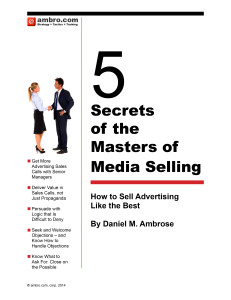Last-minute, short term sales incentives designed to goose sales team members, or to push customers, to close sales in a sort time frame, like a particular month or quarter, get in the way of long term success. Many senior managers, without experience in sales, try to increase sales by setting deadlines and adding bonuses that hurt sales and hurt business.
According to Ken Krogue, writing in the Harvard Business Review, “It is a vicious cycle. And companies know it. Yet they continue the practice, month after month and year after year, perhaps unaware of how much it’s really costing them.” Now, a team at Inside Sales has conducted large-sample research that quantifies the cost of pressure to close deals at the end of a measurement period.
 By coaching and incentivizing sales people to force prospects to say “yes” or “no” before the contact is ready, management gets more “nos” than “yeses.” In some cases companies simply leave money on the table by offering a discount that would not be necessary if they let the sale take its normal course.
By coaching and incentivizing sales people to force prospects to say “yes” or “no” before the contact is ready, management gets more “nos” than “yeses.” In some cases companies simply leave money on the table by offering a discount that would not be necessary if they let the sale take its normal course.
By analyzing almost 10 million sales transactions from more than 150 companies over 9 quarters, InsideSales.com found that sales people close 3 times as many deals at the end of the month as normal, but lose 11 times as may sales by putting too much pressure to decide on prospects.
Advertising-media sales are particularly prone to this revenue-and-brand-value-destroying tactic of pushing last minute sales. Like an airline that doesn’t want to fly empty seats from place to place, media avails that go un-sold are an anathema, whether it’s spots, or medium rectangles or pages, filling them with house-ads that drive no revenue is understandingly something to be avoided.
Short term goals get in the way of success in two ways: First, by offering sales people a big reward for sales at the end of a month, but taking away that incentive the first day of the next month, sales people may push harder than appropriate — be less client-centric — than they would be otherwise. Too much pressure gets a “no” where patience could get a “yes.” Second, by offering clients special-pricing at the end of a the month or quarter or year, companies are training customers that a lower price can be had by waiting for the next period end, or that price isn’t really related to value. The two factors hurt reputation AND revenue!
Getting sales compensation plans right for media companies is mission-critical for success. Too many media companies set goals badly or think that more incentive will drive more sales. In real life, properly chosen sales people have a professional pride that is at least as important to them as their compensation. Professional pride makes them want to do what is right for customers, not try to bend their customers to an artificial decision time. Don’t make your sales people choose between their good reputation with customers and prospects and their pocketbooks.

